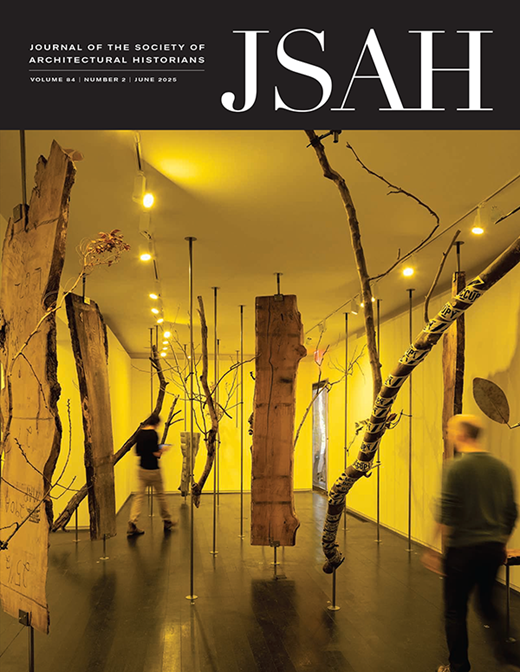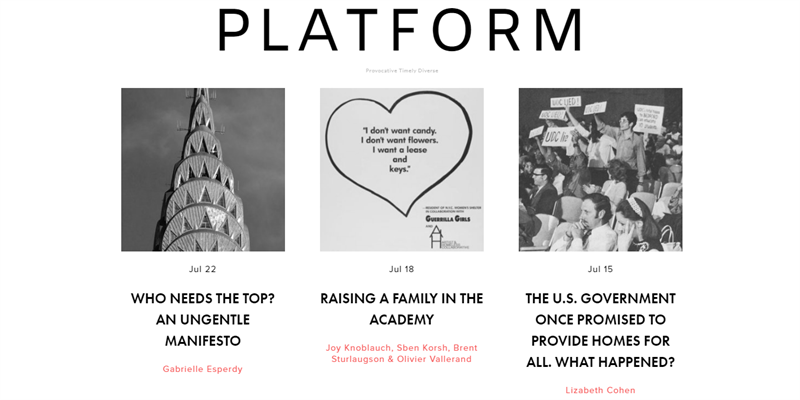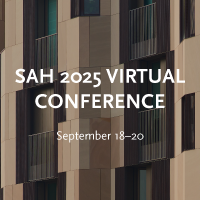-
Membership
Membership
Anyone with an interest in the history of the built environment is welcome to join the Society of Architectural Historians -
Conferences
Conferences
SAH Annual International Conferences bring members together for scholarly exchange and networking -
Publications
Publications
Through print and digital publications, SAH documents the history of the built environment and disseminates scholarshipLatest Issue:

-
Programs
Programs
SAH promotes meaningful engagement with the history of the built environment through its programsMember Programs
-
Jobs & Opportunities
Jobs & Opportunities
SAH provides resources, fellowships, and grants to help further your career and professional life -
Support
Support
We invite you to support the educational mission of SAH by making a gift, becoming a member, or volunteering -
About
About
SAH promotes the study, interpretation, and conservation of the built environment worldwide for the benefit of all
Take a Stand: Architecture Matters
On June 24, 2019, we launched PLATFORM, a new digital venue for public conversations about architecture, the built environment, and landscape. It features timely short essays organized into six sections—Finding, House Histories, Opinion, Reading /Listening/Watching, Specifying, and Teaching/Working—that serve as entry points into different realms of discussion, and address different constituencies and interests. Our goal is to reach a broader audience than academics and professionals working on architecture and urbanism, because we believe that the built environment is too important to be confined to scholarly and professional silos. PLATFORM, explicitly outward-facing, is thus a work of public humanities, designed to allow writers in our fields to shed light on a range of contemporary concerns. As a digital forum, it leverages the capabilities of new media to facilitate this conversation.
PLATFORM is an invitation to take a stand. We want our contributors and readers to assess critically how the built environment affects us, and to consider how people around the world are using space as an instrument of change. We want all of us—readers, editors, and contributors--to reckon with how knowledge about architecture and the environment is disseminated, what our culture teaches us to see, and what it asks us to ignore. We encourage readers to intervene, to interpret, and to use space to achieve democratizing, liberatory aims.

Beginnings
The idea of a new kind of digital venue for conversation on the built environment was first broached at Architectural History Redefined, a conference hosted to honor the scholarship of Dell Upton at the Bernard and Ann Spitzer School of Architecture, City College of New York (CCNY), on April 13–14, 2018. The conference, spearheaded by Marta Gutman, brought together Upton’s former and current students and colleagues with CCNY students and faculty, as well as scholars from other institutions in New York and beyond. Upton’s work has transformed how scholars approach ordinary lives and everyday landscapes. The symposium provided the rare opportunity to showcase and discuss the propagation and evolution of this approach through the work of his students and colleagues located in a variety of institutions and regions across the world. The format of the panels comprising five-minute presentations followed by a discussion, produced engaging conversations on a range of topics from design and pedagogy to the history of colonialism and racism, teaching in the classroom, in national parks, and in the prison, and architecture and cities as public culture.
At the concluding roundtable of the conference, Mary McLeod suggested that this critical conversation—and approaches to the built environment that emphasize the social and political, more broadly—should be shared with a larger public. At the Society of Architectural Historians annual conference, a week later, Swati Chattopadhyay, Marta Gutman, Zeynep Kezer, and Jeremy White met to discuss plans and possibilities. These initial conversations grew into a more coherent scheme with William Littmann and Matthew Lasner on board, and supported by peers who reviewed the ideas and shared their views.
Our objective is not to replicate the format of an academic journal, but to offer an alternative venue for timely, provocative, and diverse exchanges on the role of the built environment and space.
Timely
PLATFORM invites timely conversations about why and how architecture and space matter. We want to convey the excitement of how architecture transforms us, our thoughts, and actions: why an archival discovery is so important today, and how a field-trip changes the optics through which we see the world moving forward. We want to illustrate how buildings, landscapes, and places, contemporary and historical, help us make sense of current events, inside and outside the architecture world, from questions about the West Bank, borderlands, and international airspace, to the challenges of urban decay and housing. We want to examine cutting-edge methods and tools for analyzing space. We want to stimulate urgent conversations about how and what we teach.
The leading venues in our fields—peer reviewed journals, popular and professional design journals, university and design presses—operate slowly, by necessity. Even on-line. But this process cannot be responsive to rapidly developing events. Where can we share work quickly—in as little as a week or two? Where can we discuss breaking news? Urgent discoveries? PLATFORM is that place.
Provocative
The form of communication is just as vital as the content of communication. We publish short-form essays and digital content (audio, photos, video, and data visualization) that facilitate discussions about the here and now, and how we relate to the past, to history, and our legacies at the present moment.
Articles and monographs provide an indispensable outlet for communicating thoroughly researched and annotated scholarship that has also gone through the thoughtful scrutiny of peer reviewers. PLAFTORM’s format accommodates short-form writing that is not generally available elsewhere. Where can we share thoughtful musings on a serendipitously encountered piece of evidence that cannot be stretched to a reasonable article length? Where can we share our excitement about a new book, documentary, or exhibition with just a brief critical description? Where can we find the opportunity for working through issues that are pressing or controversial? Where is the forum for provocation—a provocation to think earnestly, immediately, and to engage in challenging conversations in the company of similarly curious and interested minds? PLATFORM is that place.
Diverse
We at PLATFORM are interested in all scales of the built environment from that of the interior and building detail to that of the city, region, and planetary. Diversity of content, however, demands diverse audiences—and contributors.
PLATFORM is broad in perspective and interdisciplinary in orientation. We invite writers from the Global South and North and from across professions and disciplines. We want to attract novices as well as old hands. We are not a closed or finite group. Unsolicited work is welcome. You do not need to have gone to school with the editors, be an architect, an architectural historian, or an academic to join the conversation. We value the diversity of opinions about how we view, read, experience, and engage with the built and natural landscapes. PLATFORM crosses disciplinary divides and is explicitly international.
We hope you will read PLATFORM, contribute to it, and help us build this conversation. Help us make a stand. Architecture matters.


Leave a commentOrder by
Newest on top Oldest on top